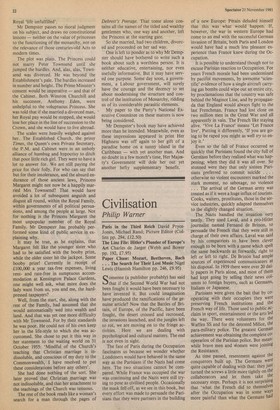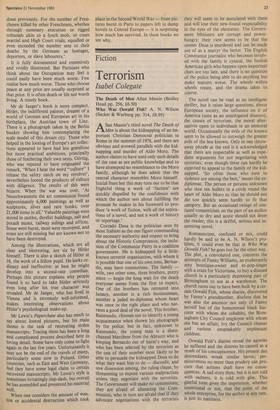Civilisation
Philip Warner Pads in the Third Reich David PryceJones, Michael Rand; Picture Editor (Collins pp. 294, £12.50) The Linz File: Hitler's Plunder of Europe's Art Charles de Jaeger (Webb and Bower pp. 192, £7.95) Paper Chase: Mozart, Beethoven, Bach . . . The Search for Their Lost Music Nigel Lewis (Hamish Hamilton pp. 246, £9.95) Someone (a publisher probably) has said that if the Second World War had not been fought it would have been necessary to have invented it. But could imagination have produced the ramifications of the genuine article? Now that the Battles of Britain, of Europe, of the Pacific, have been fought, the desert crossed and recrossed, the invasions launched, and the jungles left to rot, we are moving on to the fringe activities. Here we are dealing with psychological and cultural matters. The end is not even in sight.
The fate of Paris during the Occupation fascinates us because we wonder whether Londoners would have behaved in the same way as the Parisians if the Nazis had come here. The two situations cannot be compared. While France was occupied the war was continuing and the Nazis were still trying to pose as civilised people. Occasionally the mask fell off, as we see in this book, but every effort was made to persuade the Parisians that they were partners in the building of a new Europe: Petain deluded himself that this was what would happen. If, however, the war in western Europe had come to an end with the successful German invasion of Britain, both Paris and London would have had a much less pleasant experience than France knew during the Occupation.
It is possible to understand though not to excuse Parisian reaction to Occupation. For years French morale had been undermined by pacifist movements, by awesome 'scien tific' evidence of how a single aircraft carrying gas bombs could wipe out an entire city, by proclamations that the country was safe behind the Maginot Line, and by propagan da that England would always fight to the last Frenchman. France had lost close on two million men in the Great War and all apparently in vain. The French like staying alive. Wive La France' means 'Let France live'. Putting it differently, 'If you are going to be raped you might as well try to enjoy it.'
Even so the fall of France occurred so quickly that Parisians found the city full of Germans before they realised what was happening; when they did it was all over. So stunned were they that only sixteen Pari sians preferred to commit suicide . . . . otherwise no violent encounters marked the stark moment, no sabotage, no violence . . . The arrival of the German army was treated as if it were a huge influx of tourists.
Cooks, waiters, prostitutes, those in the service industries, quickly adapted themselves to the slightly changed situation.
The Nazis handled the situation very neatly. They used Laval, and a pro-Hitler journalist named Fernand de Brinon, to persuade the French that they were still in charge of their own affairs. Laval was said by his compatriots to have been clever enough to be born with a name which spelt the same backwards as forwards, right to left or left to right. De Brinon had ample sources of experienced communicators at his disposal. In 1939 there were over 20 dai ly papers in Paris alone, and most of them had kept going by selling their news columns to foreign buyers, such as Germans, Italians or Japanese.
Parisians were given the bait that by cooperating with their occupiers they were preserving French institutions and the French way of life. Those used to public acclaim in sport, entertainment or the arts led the way. There were volunteers for the Waffen SS and for the detested Milice, the para-military police. The greatest German achievement was obtaining the complete cooperation of the Parisian police. But meanwhile brave men and vGomen were joining the Resistance.
As time passed, resentment against the conquerors built up. The Germans were quite capable of dealing with that: they just turned the screws a little more tightly on the collaborators and let them take the necessary steps. Perhaps it is not surprising that 'what the French did to themselves after the Occupation was in some waYs more painful than what the Germans had done previously. For the number of Frenchmen killed by other Frenchmen, whether through summary execution or rigged tribunals akin to a lynch mob, or court martial and High Court trials, equalled or even exceeded the number sent to their deaths by the Germans as hostages, deportees, or slave labourers.'
It is fully documented and extensively and vividly illustrated. But Parisians who think about the Occupation may feel it could easily have been much worse. Few realise how much worse. Those who choose peace at any price are usually surprised at that price. It is often death or life not worth living. A timely book.
Mr de Jaeger's book is more compact. Hitler, the indifferent painter, dreamt of a world of German and European art in his birthplace, the Austrian town of Linz. There is a photograph taken in the Berlin bunker showing him contemplating the scale model of this dream city. Those who helped in the looting of Europe's art collections appeared to have had less grandiose but more practical ambitions, principally those of feathering their own nests. Goring, who was reputed to have originated the remark, 'When I hear the word "culture" I release the safety catch on my revolver', nevertheless looted the products of culture with diligence. The results of this were bizarre. When the war was over, 'At Neuschwanstein the art commission found approximately 6,000 paintings as well as sculptures, silver and rare books, over 21,000 items in all.' Valuable paintings were stored in castles, derelict buildings, salt and potash mines, railway sidings and offices. Some were burnt, most were recovered, and some are still missing but are known not to have been destroyed.
Among the illustrations, which are all clear and interesting, are six by Hitler himself. There is also a sketch of Hitler at 16, the work of a fellow pupil. He looks ordinary and ineffective: at best he might develop into a second-rate comedian. Perhaps this picture explains why people found it so hard to take Hitler seriously even long after his true character was revealed. Mr de Jaeger, who has lived in Vienna and is extremely well-informed, makes interesting observations about Hitler's psychological make-up.
Mr Lewis's Paperchase also has much to say about looted pictures, but his main theme is the task of recovering stolen manuscripts. Tracing them has been a long and complicated process described here in loving detail. Some have only come to light again in the last few years. Unfortunately it may not be the end of the travels of many, Particularly some now in Poland. Other countries, such as East and West Germany, feel they have some legal claim to certain recovered manuscripts. Mr Lewis's style is sometimes irritatingly slap-dash, but overall he has assembled and presented his material When one considers the amount of wanton or accidental destruction which took place in the Second World War — from pictures burnt in Paris to papers left in damp hovels in Central Europe — it is surprising how much has survived. In these books we see why.











































 Previous page
Previous page